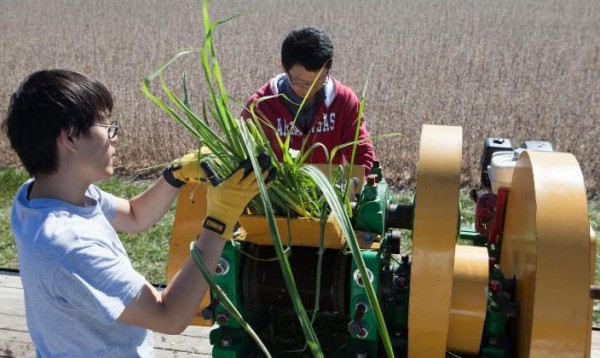By Arthur Dominic J. Villasanta , | April 05, 2017

Researchers extract juice from sugarcane engineered to produce oil for biodiesel.
Genetically engineered sugarcane can produce oil in its leaves and stems for biodiesel production. Surprisingly, this modified sugarcane can also produce more sugar that can be used for producing ethanol to power motor vehicles, as proven by a multi-institutional team led by the University of Illinois.
Like Us on Facebook
The dual-purpose bioenergy crops are predicted to be more than five times more profitable per acre than soybeans and two times more profitable than corn. More importantly, sugarcane can be grown on marginal land in the Gulf Coast region that doesn't support good corn or soybean yields.
"Instead of fields of oil pumps, we envision fields of green plants sustainably producing biofuel in perpetuity on our nation's soil, particularly marginal soil that is not well suited to food production," said Stephen Long, Gutgsell Endowed Professor of Plant Biology and Crop Sciences.
Long leads the research project Plants Engineered to Replace Oil in Sugarcane and Sweet Sorghum (PETROSS) that has pioneered this work at the Carl R. Woese Institute for Genomic Biology at Illinois.
"As it can take 10-15 years for this technology to reach farmers' fields, we need to develop these solutions to ensure our fuel security today and as long as we need liquid fuels into the future."
This study published in Biocatalysis and Agricultural Biotechnology analyzes the project's first genetically modified sugarcane varieties.
Using a juicer, researchers extracted about 90% of the sugar and 60% of the oil from the plant. The juice was fermented to produce ethanol and later treated with organic solvents to recover the oil. The team has patented the method used to separate the oil and sugar.
They recovered 0.5 and 0.8 percent oil from two of the modified sugarcane lines, which is 67% and 167% more oil than unmodified sugarcane, respectively.
"The oil composition is comparable to that obtained from other feedstocks like seaweed or algae that are being engineered to produce oil," said co-author Vijay Singh, Director of the Integrated Bioprocessing Research Laboratory at Illinois.
"We expected that as oil production increased, sugar production would decrease, based on our computer models," Long said.
"However, we found that the plant can produce more oil without loss of sugar production, which means our plants may ultimately be even more productive than we originally anticipated."
To date, PETROSS has engineered sugarcane with 13 percent oil, 8 percent of which is the oil that can be converted into biodiesel. According to the project's economic analyses, plants with just five percent oil will produce an extra 123 gallons of biodiesel per acre than soybeans and 350 more gallons of ethanol per acre than corn.
-
Use of Coronavirus Pandemic Drones Raises Privacy Concerns: Drones Spread Fear, Local Officials Say

-
Coronavirus Hampers The Delivery Of Lockheed Martin F-35 Stealth Fighters For 2020

-
Instagram Speeds Up Plans to Add Account Memorialization Feature Due to COVID-19 Deaths

-
NASA: Perseverance Plans to Bring 'Mars Rock' to Earth in 2031

-
600 Dead And 3,000 In The Hospital as Iranians Believed Drinking High-Concentrations of Alcohol Can Cure The Coronavirus

-
600 Dead And 3,000 In The Hospital as Iranians Believed Drinking High-Concentrations of Alcohol Can Cure The Coronavirus

-
COVID-19: Doctors, Nurses Use Virtual Reality to Learn New Skills in Treating Coronavirus Patients










